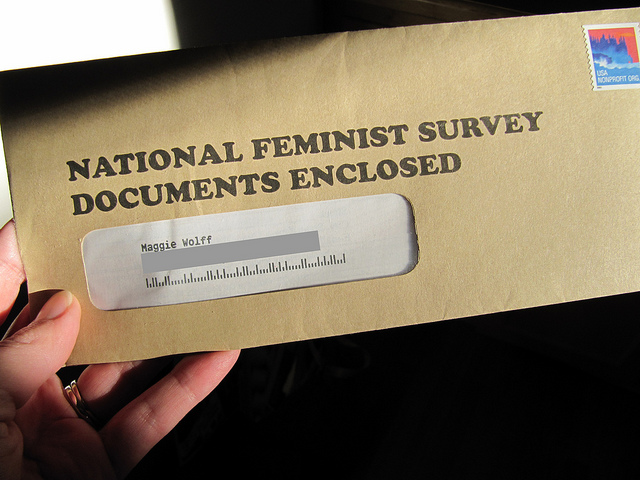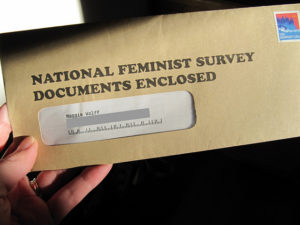Three years ago, I did not consider myself a feminist.
Feminism, unfortunately, carries a heavy stigma with its name. Coming from a small, conservative town in Tennessee, the only concepts I had of feminism were the bra-burners and man-haters (misandrists). I loved the men in my life and never felt oppressed. I was taught my role in society by observing other strong, hardworking women around me. I also went to a Southern Baptist church three times a week.
Everything I knew about feminists seemed to be the complete opposite from the values I held as a Christian. As a result, I unintentionally (and intentionally at times) placed restrictions on my ability to empathize with others’ stories and to love and support other people, especially women.
Once I moved away from my hometown and went to college, my eyes were opened to a movement that represented community, resistance, and sisterhood, all ideas that looked a whole lot different at college than back home. My eyes were opened to all kinds of injustice people experienced through the different – isms : racism, sexism, etc. In my sight, feminism began to transform into a viable lifeline for women around the globe rather than a group of radicals who chose to whine. Feminism became a necessity to support, a cause I could not ignore.
When I realized I supported much of what the feminist movement represents, I struggled with calling myself a feminist. Would my family be disappointed? Would God be disappointed? Could I be a Christian and still be a feminist?
I came to the conclusion that not only could I be a Christian and a feminist, but my faith encouraged it. What better way to love the people God created than to treat them equally? A new course in my life was born with that realization.
In the midst of reconciling and adopting both of the identities together, I realized that women within the feminist movement held predominantly negative views towards institutionalized religion, especially Christianity. I read countless statements where Christians were called oppressive, close minded, and all-around horrible people.
While I could understand where most of their views came from, I wondered if the feminist movement wanted religious women to participate. Not only religious women, but conservative women, pro-life women, or compliant women: women who did not hold views traditional to what was ascribed to feminists.
One of the biggest reasons that people told me they were not feminists was because they do not agree with the values they believe the feminist movement requires to participate, such as being liberal, pro-choice, angry, or outspoken. Plus, the feminist movement has been known as a white women’s movement for a while, since heterosexual, cisgender, middle to upper class, white women’s rights have long been unfairly at the forefront. Thus, many rightfully felt unwelcome.
Recently, I wanted to know if other women held the same concern I had in my newly feminist days, so I created a survey to get some answers.
The results from my survey were surprisingly shocking. Even who responded provided insight. Ninety-four percent of the respondents were white. Out of the 240 in total, 180 claimed they were feminists, with 147 of them women. Of those 180, 148 had some sort of spiritual practice, 72 held political ideologies other than liberalism.
Sixty-eight of the total respondents felt their voices was not welcome in the movement, 42 of them female. Of the women, 40 had spiritual practices and 37 held political ideologies other than liberalism.
My survey included a comment section, so I could better understand people’s yes or no responses. Here are some of the comments:
“My issues as a black woman are always last on the list, always used for empathy but never at the top of priorities.”
“Feminism claims to represent all women, but not those with pro-life or small government views.”
“I feel since I am a moderate in my political thoughts, I am not valued by the movement.”
Statistics can be cumbersome. I understand my survey was not terribly encompassing of people who did not identify as liberal, Christian, or white. That just happened to be the demographic that responded on Facebook and other outside sources.
All of these facts aside, I am really happy that most people, 169 to be exact, felt their voice was welcome in the feminist movement. I believe that, while feminism is not perfect, the movement has progressed so far since its origination.
We still have work to do though. There was still a percentage who did not feel welcome. There are more people in the world who do not believe they have a place in movement. With the political climate more toxic than ever, how do we unite together, despite our differences, in order to fight against the systems that oppress us and to enhance the quality of life for women?
I do not have the answer to that question, but I think I have some tips on how to start.
We unite together over our similarities, not our differences. Our differences make us who we are, yes, but many women want the exact same thing: equality. We want equal opportunities. We as women collectively experience the effects of the patriarchy in one way or another. So instead of allowing opinions to divide us, allow our fight towards equality to bring us together.
Create space at the table. The metaphorical table where we invite each other to come, sit, and discuss. Discussion does not mean persuasion or change. Discussion leads to knowledge. Discussion opens the door to empathy and community. We should listen to understand, not to respond.
Realize that feminism looks different for each individual. I believe Roxane Gay in the introduction to her book, Bad Feminist , says it best: “We don’t all have to believe in the same feminism. Feminism can be pluralistic so long as we respect the different feminisms we carry with us, so long as we give enough of a damn to try to minimize the fractures between us”. I may not have the same feminism as other women, but respect and progress will lead to a more collective future.
For those who do not want equal rights for women, do not consider yourself a feminist and do expect resistance. For those of us who do want a better future for women all around the globe, let’s unite together. There’s truly power in numbers.


There are no comments
Add yours